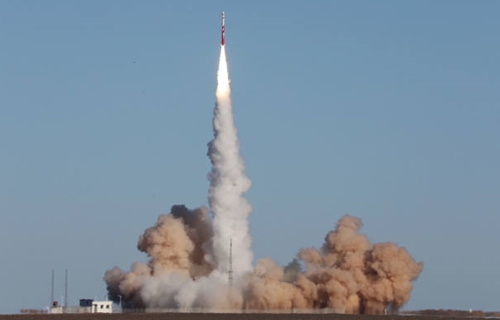蓝箭航天称,“朱雀一号”发射升空后,一二级工作正常,三级出现异常。这枚火箭搭载着央视的一颗商业卫星。

The first-ever attempt by a private Chinese company to send a rocket into space has failed in an increasingly heated competition between commercial space start-ups.
中国由一家私营公司向太空发射火箭的首次尝试以失败告终。目前商业太空初创企业之间的竞争日益激烈。
On Saturday, Beijing-based start-up LandSpace said “something abnormal happened after the second stage” of launching its Zhuque-1 rocket from a national launch site in the Gobi desert. The rocket, named after a mythological Chinese phoenix, had been carrying a commercial satellite for state broadcaster CCTV.
周六,总部位于北京的初创公司蓝箭航天(LandSpace)表示,在地处戈壁滩的国家发射场发射其运载火箭“朱雀一号”后,一二级工作正常,三级出现异常。这枚火箭以中国神话中的神兽命名,搭载着国家电视台中国中央电视台(CCTV)的一颗商业卫星。
Despite its doomed trajectory, the red-and-white rocket reflects the increased blurring between China’s private and state-led hardware companies as the country enlists the private sector to develop globally competitive dual-use technologies.
尽管发射失败,但这枚红白两色的火箭反映了在中国鼓励私营部门开发具有全球竞争力的军民两用技术的背景下,中国民营的和国家主导的硬件公司之间界限日益模糊。
Closer ties between civilian and military efforts form part of a sweeping military modernisation drive initiated by Chinese president Xi Jinping that has already shaken up the People’s Liberation Army, China’s fighting force.
民用和军用研发努力之间的更紧密联系,构成中国国家主席习近平发起的已经给解放军带来很大变化的全面军事现代化建设的一部分。
So-called “civil military fusion” has been most apparent in the space industry. Until recently, only Chinese state-owned firms were permitted to build, launch and operate satellites. In 2014, new rules began allowing private companies to participate.
所谓的“军民融合”在航天工业最为明显。直到不久以前,中国还只允许国有企业建造、发射和运营卫星。2014年,新规则开始允许私营公司参与。
“Private companies have more flexible and advanced mechanisms, and it will be a win-win situation to combine our technological base with their flexibility and lower costs,” Fu Zhimin, chief engineer at China Aerospace Science and Industry Corp, China’s top space and defence contractor, told state media last month.
中国顶级空间和军工承包商——中国航天科工集团(CASIC)的总工艺师符志民上月对官方媒体表示,私营公司拥有更加灵活和先进的机制,将中国航天科工集团的技术基础与它们的灵活性和低成本相结合,将形成一个双赢的局面。
Since 2014, a handful of private Chinese space start-ups, almost entirely operated by former employees of state defence contractors, have popped up. At stake is a $420bn commercial space industry centring around the lucrative business of sending small commercial satellites used by telecoms companies and research institutions.
自2014年以来,中国出现了几家私营太空初创企业,它们几乎全部由国营军工承包商的前雇员经营。整个商业太空产业价值4200亿美元,其中为电信公司和研究机构发射小型商业卫星是一项利润特别丰厚的业务。
However, critics say that Chinese interest in the commercial space sector dovetails with state goals to provide China with its own secure communications and a global positioning system (GPS) infrastructure in parallel to those owned by foreign companies.
然而,批评人士表示,中国对商业太空行业的兴趣与国家目标相吻合,这个目标就是使中国拥有自己的安全通信和全球定位系统(GPS)基础设施,与外国公司拥有的基础设施相仿。
“If you build the satellite and encryption, you will have access to the encryption,” explained Keith Hayward, former head of research at the Royal Aeronautical Society in the UK.
“如果你造卫星和发展加密技术,你就可以使用加密,”英国皇家航空学会(Royal Aeronautical Society)前研究主管凯斯?海沃德(Keith Hayward)解释道。
LandSpace’s failed launch comes on the heels of China’s first two suborbital rocket launches, meaning the rockets entered space but did not complete a revolution around Earth.
蓝箭航天发射运载火箭失败之前,中国进行了两次亚轨道火箭发射,即火箭进入太空但没有完成围绕地球一圈的运行。
On September 5, start-up iSpace became the first Chinese start-up to launch a suborbital rocket. only two days later, Chinese launch start-up OneSpace, which counts among its backers state defence contractor Aviation Industry Corporation of China, successfully completed its first suborbital rocket launch.
9月5日,星际荣耀(iSpace)成为首家发射亚轨道火箭的中国初创公司。仅仅两天后,中国发射初创公司零壹空间(OneSpace)——其支持者包括国有军工承包商中国航空工业集团(AVIC)——成功完成了首次亚轨道火箭发射。







